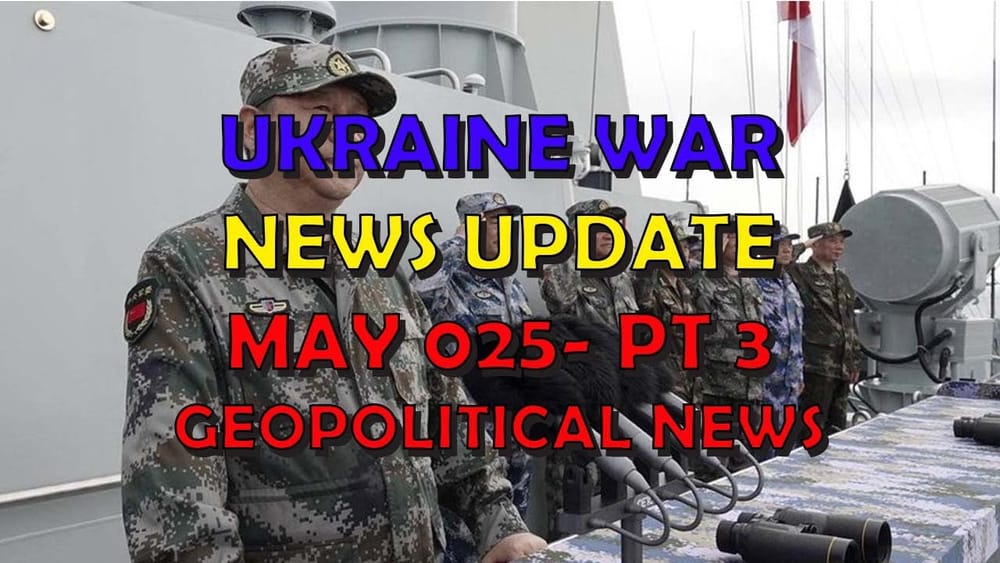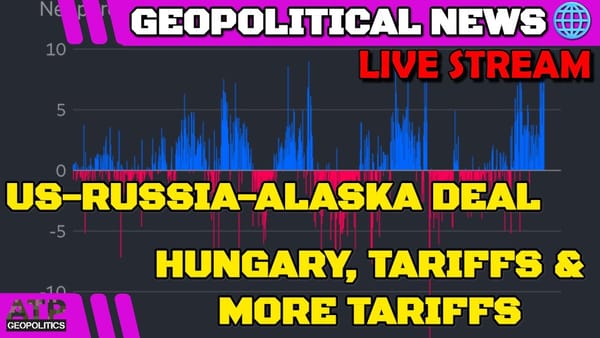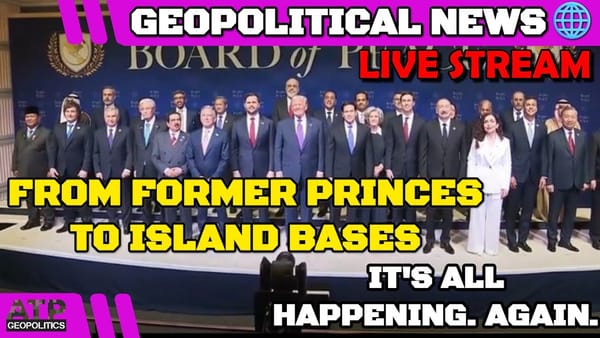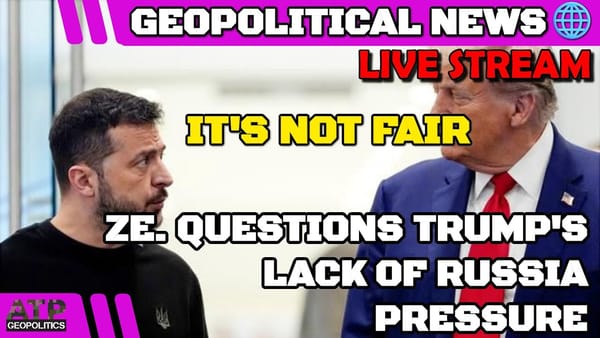Ukraine War Update NEWS: Geopolitics News
Table of Contents 📖
"The best money spent on Taiwan is spent on Ukraine. A really robust repudiation of the Russian invasion would have sent a very strong message to China."
Hello Team
🎦 00:00-01:06⏩
Jonathan welcomes viewers and mentions that a mapping update is unlikely due to a busy house. He reminds viewers of his upcoming talk on 15th June in North Hampshire, UK, to raise funds for drones for Ukraine.
Return to top⤴️
Russian Strikes on Kharkiv Shopping Mall
🎦 01:06-02:47⏩
Jonathan highlights the recent Russian strikes on a Kharkiv shopping mall, condemning them as "overt terrorism." He criticizes the lack of coverage in some news outlets and praises French President Macron's condemnation of the attacks. Jonathan expresses frustration with media narratives that focus heavily on initial Russian attacks but downplay or ignore successful Ukrainian counteroffensives. He criticizes the lack of acknowledgement for Ukraine's efforts in repelling a large-scale Russian attack.
Return to top⤴️
Impact of the War on the Russian Economy
🎦 02:47-04:37⏩
Jonathan discusses the impact of the war on the Russian economy, citing a shortage of blue-collar workers due to recruitment by the military-industrial complex and companies in occupied territories. He highlights the rising salaries and competition for workers, leading to a wage spiral and inflation. Jonathan argues that the war is significantly impacting the Russian economy, particularly in terms of labour shortages. He cites an expert's analysis to support his claim and suggests that the situation will continue to pose challenges for Russia.
Return to top⤴️
Hungary's Stance on NATO and Ukraine
🎦 04:37-06:20⏩
Jonathan criticizes Hungarian Prime Minister Viktor Orbán's attempts to redefine Hungary's NATO membership and block aid to Ukraine. He expresses frustration with Orbán's pro-Russian stance and suggests that Hungary's economic woes should be a bigger concern for its population than appeasing Putin. He believes that there will soon be a "tipping point" where the Hungarian people will demand a change in leadership. Jonathan criticizes Orbán for hindering Ukraine's access to €2 billion in frozen Russian assets that could be used for weapons.
Return to top⤴️
Interview with Polish Foreign Minister Sikorsky
🎦 06:20-18:49⏩
- Jonathan discusses an interview with Polish Foreign Minister Radosław Sikorsky in The Guardian.
- Sikorsky revealed that the US warned Russia against using nuclear weapons, even tactical ones, stating that any such use would result in a devastating conventional military response targeting Russian assets in Ukraine.
- Jonathan recalls previous reports of this warning, suggesting that the US threatened to neutralize Russia's entire fleet. He emphasizes the deterrent effect of this warning, coupled with pressure from China and India, on Russia's nuclear ambitions.
- Jonathan highlights China's significant control of Ukrainian farmland (15%) and its reliance on Ukraine as a breadbasket for food security. He believes this factor adds to China's pressure on Russia to avoid nuclear escalation, as it would directly threaten China's food supply.
- He argues that Russia is unlikely to use nuclear weapons due to these warnings and the potential for immediate and severe conventional retaliation. He points to Ukraine's recent successful strike on a Russian early warning radar system as evidence of their vulnerability.
- Jonathan praises Sikorsky's staunch support for Ukraine, noting his call for long-term European rearmament and deeper UK involvement in EU defense structures post-Brexit.
- He reflects on the implications of Brexit for UK-EU security cooperation, acknowledging challenges but emphasizing the need for close collaboration in light of Russia's actions.
- He argues that closer UK-EU ties are mutually beneficial, particularly given the rise of far-right parties in Europe, and suggests that the UK may have played a stabilizing role within the EU.
- Jonathan highlights key points from the Guardian article:
- Poland supports Ukraine's right to strike military targets inside Russia.
- Sikorsky criticizes the EU's principle of unanimity for sanctions, which has allowed individual member states (implicitly Hungary) to delay their implementation. He suggests making sanctions violations an EU crime prosecutable by the European Prosecution Service.
- Sikorsky criticizes Putin, calling him an "absurd leader of international conservatism" and highlighting his KGB past.
- He supports Ukraine's right to strike military targets within Russia, arguing that Russia has already targeted civilian infrastructure and that setting red lines only encourages Russia to exploit them.
- Jonathan notes US President Biden's recent labeling of Putin as a "brutal tyrant" and reflects on the significance of this statement, suggesting it reflects a significant deterioration in US-Russia relations.
- He commends Sikorsky for aligning with recent statements by other European leaders, such as Lithuanian Prime Minister Ingrida Šimonytė and French President Emmanuel Macron, who have advocated for stronger support for Ukraine and a shift away from appeasement.
- Jonathan reiterates his point from a previous video about Jens Stoltenberg's interview in The Economist. Stoltenberg, NATO's Secretary General, supports Ukraine's right to strike within Russia and has suggested that NATO could invoke Article 5 in response to a serious cyberattack on a member state. Jonathan expresses concern about the lack of clarity regarding the threshold for invoking Article 5 in cyberspace.
- He mentions German Green Party politician Anton Hofreiter's support for allowing Ukraine to strike military targets inside Russia. He notes that the Greens have been consistently more supportive of Ukraine than their coalition partners in the German government.
Jan Marsalek, Wirecard, and Russian Influence in Austria
🎦 18:49-29:31⏩
- Jonathan discusses a lengthy Politico article titled "Putin Hijacked Austria’s Spy Service. Now He’s Going After Its Government". He encourages viewers to search his previous videos, which will soon be searchable thanks to the efforts of a viewer named Benny who is using AI to summarise and index his content.
- The Politico article details how Jan Marsalek, the former CEO of Wirecard, allegedly colluded with the Kremlin and Austria's far-right Freedom Party (FPÖ) to advance Russia's interests.
- Jonathan draws parallels between the FPÖ and other right-wing populist parties in Europe, like UKIP in the UK, AfD in Germany, and the National Rally in France. He critiques these parties for using the language of freedom while advocating for restrictive policies on immigration.
- He briefly delves into a discussion of libertarianism, citing Ayn Rand as an example of a true libertarian who supported open borders and individual autonomy.
- Returning to the Politico article, Jonathan highlights the alleged Russian intelligence operation involving Marsalek and the FPÖ, and the attempts by Austrian authorities to investigate and dismantle the network.
- He recounts the arrest of six Bulgarians in the UK who were allegedly working for Marsalek and the discovery of communications between Marsalek and the alleged ringleader, Orlin Rusev, suggesting intensive engagement by Moscow.
- He describes how a former Austrian intelligence officer, identified as "Ott", continued working for Marsalek even after being arrested in 2021. Ott allegedly provided Marsalek's network with mobile phones belonging to senior Austrian officials, as well as a highly encrypted "Siner" laptop used by German intelligence, in exchange for money.
- Jonathan expresses concern about the FPÖ's potential rise to power in Austria, given their pro-Russian stance and opposition to EU sanctions against Moscow.
- He notes that Austria is already heavily reliant on Russian energy and has been slow to reduce its economic dependence, despite pressure from the EU and US.
- Jonathan argues that Russia sees Austria as a valuable target for influence and is willing to go to great lengths to shape its politics. He speculates that an FPÖ-led government would lead to even closer economic ties between Austria and Russia, creating a "Putin-friendly bloc" in Central Europe and undermining European security.
- Jonathan criticizes the Austrian government's historical closeness to Russia, citing Putin's attendance at the wedding of Austria's former foreign minister, Karin Kneissl, as evidence of this relationship.
Russia's Interference in UK Elections
🎦 29:31-32:37⏩
- Jonathan discusses an article by Ivana Stradner, a Balkans expert, in the Daily Telegraph. The article warns of Russia's plans to interfere in upcoming elections in the UK, EU, and US.
- Stradner argues that Russia will try to destabilize these countries, particularly the UK in the run-up to its July 4th general election.
- She points to warnings from Western intelligence agencies about potential Russian sabotage attempts in Europe. Jonathan cites a statement by Anne Keast-Butler, Director of GCHQ, who cautioned about Russian cyberattacks and other threats against the UK.
- Jonathan agrees with Stradner's assessment that Russia excels in cyber and information warfare, exploiting domestic issues and aiming to undermine support for Ukraine.
- He references the UK Parliament's Intelligence and Security Committee's report on Russian interference in the 2014 Scottish independence referendum and mentions Russia Today's (RT) dedicated section on the Scottish independence movement as evidence of their continued interest in exploiting this issue. He criticizes the Daily Telegraph for not mentioning Russia's well-documented interference in the Brexit referendum, attributing this omission to the newspaper's pro-Brexit stance.
- Jonathan highlights Russia's skill in exploiting existing social and political divisions, particularly those related to culture wars, to portray the UK as an imperialist, colonialist, and racist country.
- He agrees with Stradner's call for a more aggressive response from the UK, suggesting that they should go on the offensive in the information space to counter Russian narratives, impose sanctions on individuals involved in Russian information warfare, and launch offensive information operations targeting Russia's sphere of influence to force them into a defensive posture.
US Secretary of State Blinken to Visit Moldova and Czech Republic
🎦 32:37-33:15⏩
- Jonathan reports that US Secretary of State Antony Blinken will visit Moldova and the Czech Republic to discuss support for Ukraine. He notes the strategic importance of maintaining close ties with these countries, particularly in light of Russia's attempts to exert influence in the region.
- He highlights the Czech Republic's strong support for Ukraine.
Suspicious Incident Involving Chechen Nationals and US Army Colonel
🎦 33:15-38:16⏩
- Jonathan reports on a shooting incident in North Carolina where a US Army Colonel shot and killed a man who was allegedly taking photos of his children.
- The deceased and another man detained for questioning were identified as Chechen nationals.
- The incident is being investigated by local authorities and the FBI.
- Jonathan acknowledges that this could be a case of an individual reacting aggressively, but he also highlights the unusual circumstances surrounding the incident. He questions why two Chechen nationals were outside a Special Forces residence taking photographs.
- Jonathan expresses concern that this incident points to Russian influence operations in the US. He mentions that US military bases have been targeted by foreign intelligence agencies, citing a Fox News report that suggests such incidents are not uncommon.
- Jonathan criticizes individuals who downplay Russia's actions and defend Russia's government. He argues that Russia is actively engaged in espionage and other hostile activities against the US.
- He uses a recent Twitter exchange as an example, where he argued that Russia's cyberattacks on US infrastructure, particularly water treatment plants, are unacceptable. Jonathan expresses frustration with those who try to minimize or justify Russia's actions, emphasizing the seriousness of cyberattacks on critical infrastructure.
Cyberattacks on Hospitals and Increased Mortality Rates
🎦 38:16-39:58⏩
- Jonathan highlights a research paper showing that hospitals hit by ransomware attacks experience a statistically significant increase in patient mortality rates.
- He emphasizes that cyberattacks have real-world consequences, including loss of life.
- Jonathan criticizes those who downplay the severity of cyberattacks, especially those targeting critical infrastructure like hospitals.
- He argues that state-sponsored cyberattacks, such as those allegedly carried out by Russia against French hospitals, are equivalent to acts of physical violence and should be treated with the same level of seriousness.
Baltic States, Poland, Norway, and Finland to Create "Drone Wall"
🎦 39:58-41:11⏩
- Jonathan reports that the Baltic states, Poland, Norway, and Finland have agreed to create a joint "drone wall" to bolster the defense of their borders.
- He compares this initiative to Romania and Greece's proposal for a European air defense shield, emphasizing the growing trend of European countries seeking closer security cooperation in response to the perceived threat from Russia.
- Jonathan emphasizes the benefits of collective defense and burden-sharing, comparing it to a "neighbourhood watch" system.
Anti-Russian Protests in Georgia
🎦 41:11-42:55⏩
- Jonathan reports on large-scale anti-Russian protests in Tbilisi, Georgia.
- He mentions that over 200 people have been arrested but the protests are ongoing.
- Jonathan expresses support for the protesters and highlights the significance of Georgian citizens pushing back against Russian influence.
- He shows footage of the protests, which include Ukrainian, Georgian, EU, and US flags.
- Jonathan emphasizes the message behind the protests: opposition to Russian-style "foreign agent" laws, which many see as an attempt to stifle dissent and civil society. He notes that these laws are often used to silence critics of the government and limit freedom of speech and assembly.
US Concerns about Russia-North Korea Military Cooperation
🎦 42:55-46:17⏩
- Jonathan reports on the Biden administration's concerns about the growing military alliance between Russia and North Korea. He cites an NBC News report that suggests this partnership could bolster North Korea's nuclear capabilities and heighten tensions in the Asia-Pacific.
- He questions whether Russia and North Korea might be planning an "October surprise" to help Donald Trump win the upcoming US presidential election, but he expresses doubts, pointing to Trump's previous promises to impose tariffs on Chinese goods, which Jonathan believes would be economically damaging for the US.
- Jonathan criticizes those who dismiss his opinions on topics like economics and politics, arguing that he has years of experience researching and writing on these subjects. He defends his right to express his views and encourages those who disagree to engage with evidence and reasoned arguments rather than resorting to ad hominem attacks or unsubstantiated claims.
China's Military Exercises Near Taiwan
🎦 46:17-48:47⏩
- Jonathan shares a viewer comment suggesting that China plans to attack Taiwan in early June, but he expresses skepticism about the claim, acknowledging that it could be misinformation or fearmongering.
- However, he acknowledges the possibility of a Chinese attack on Taiwan, given the current global situation. He suggests that China might be emboldened by the West's somewhat divided response to the war in Ukraine. He argues that a more united and robust response to the Russian invasion might have served as a stronger deterrent to China.
- Jonathan ponders whether China would risk a major conflict by attacking Taiwan, but he ultimately concludes that China might perceive the West's response to the Ukraine war as hesitant and see an opportunity to advance its own interests.
- He argues that the US, which has been advocating for increased spending on Taiwan's defense, should have been more proactive in supporting Ukraine. Jonathan emphasizes that a decisive victory for Ukraine, backed by unwavering Western support, would have sent a much clearer message to China about the consequences of military aggression.
- He believes that China is learning from the West's response, or lack thereof, in Ukraine and that this could embolden them to take more assertive action in the future.
Wrap Up
🎦 48:47-49:00⏩
Jonathan concludes the video by thanking viewers for watching, asking them to like, subscribe, and share the video. He apologizes for the lengthy rambling but acknowledges that his viewers are accustomed to his style. Jonathan expresses his appreciation for their support and signs off.
Return to top⤴️




